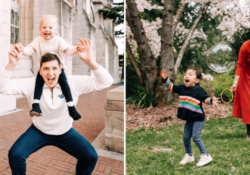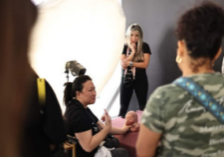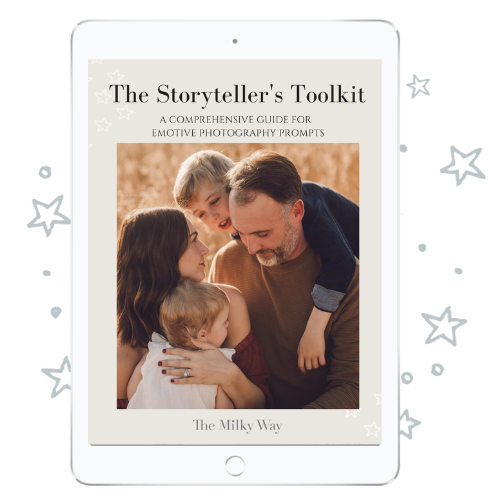Systems for Success – The Power of Streamlining your Photography Business with Annemie Tonken
Whether you’re a new or seasoned photographer, setting up systems that support your business is key. There are so many tools out there for streamlining, prioritizing, and delegating … It can be overwhelming to know where to start. And easy to bounce back and forth, never settling on a defined process.
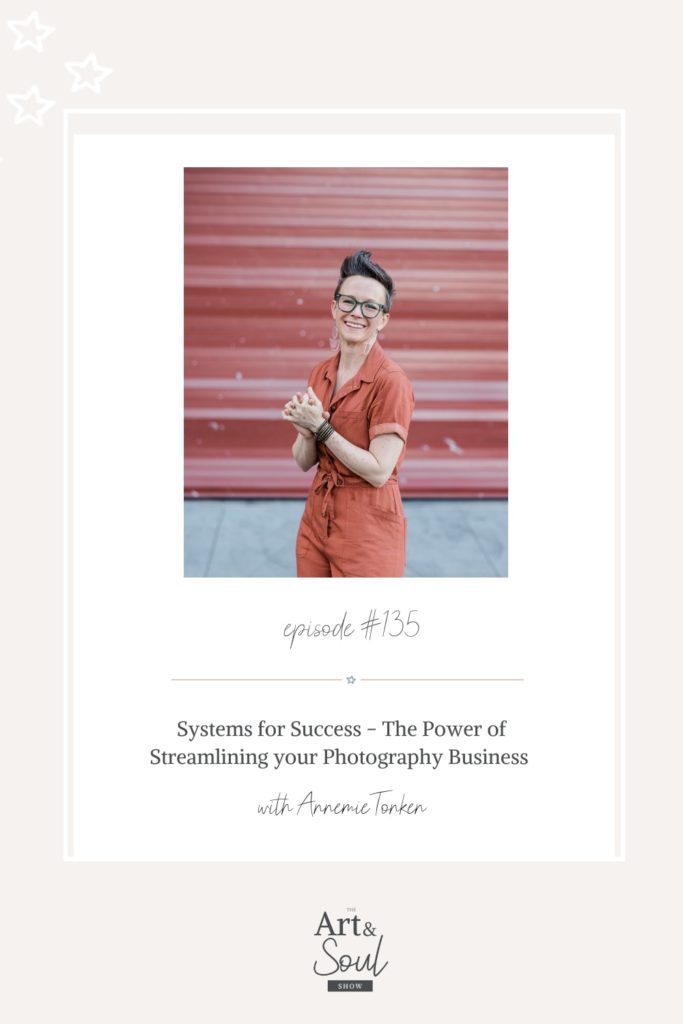
In today’s episode, I’m chatting with Annemie Tonken, a photographer and business educator who helps other photographers set up simple systems that work for their needs and lifestyle, and she’ll be a teacher at our upcoming Online Business Retreat!
Annemie shares her advice for learning new systems, the importance of a supportive community, and how to determine the business model that’s right for you. She is chock full of wisdom on setting up a simple sales system and also reverse engineering how you think about and approach your business, from both execution and profitability perspectives.
What’s in this episode:
- How Annemie learned that she is passionate about the education side of business [02:42]
- How she systemazies being a photographer and running an education business/podcast [04:41]
- Her advice for pushing through overwhelm to learn new systems [07:39]
- Annemie shares about her recent Invisible to Irresistible Challenge [11:01]
- Reverse engineering how much money you want to make and how many clients you’ll need to get there [13:37]
- Finding supportive communities and embracing constructive feedback [16:43]
- The three different business models that Annemie sees in the working world and understanding which is best for you [20:59]
- Annemie’s simple sales system [26:19]
- Annemie’s advice for photographers who need better systems but don’t know where to start [36:08]
If you want to create more ease in your life by setting up systems that will work for your unique business, tune in to this episode.
SUBSCRIBE: iTunes | Spotify | Stitcher
Resources Mentioned
Meet Annemie
Annemie* has been a professional photographer since 2010 and is now a respected educator, speaker, and podcaster focusing on business systems and strategies that help creative entrepreneurs run profitable, sustainable businesses they love.
She’s the host of This Can’t Be That Hard, a top-rated weekly business podcast for photographers, and the creator of the Simple Sales System, which is used by thousands of photographers worldwide to create in-person sales-level income and service in an automated, workflow-friendly way.
Connect with Annemie
Check out Annemie’s Facebook Group
Did you love hearing Annemie’s tips for finding and implementing systems for your business? Check out another episode from Colie James
Transcript
[00:00:00] Annemie Tonken The thing about running a business is that there is no end point, right? We are always tweaking, evolving, making it better. And if you can lean into that and sort of enjoy the process, great, because you’re going to be doing it. And the more frequently you do it and the more ways that you can kind of be inspired to think about it differently, the better and better and better it’s going to get. We are creative people. We can solve problems in all kinds of different ways. We just have to be kind of redirected to those problems. And it’s one of the things that I love most about your retreats is that you get to learn from all these different people who have all this amazing knowledge but come at it from different directions. And what you can get out of that for like literally the world’s best price ever is nothing short of magical.
[00:00:55] Lisa DiGeso Welcome to the Art and Soul Show, where we dive into heart opening chats on photography, business, life and that messy in-between. I’m your host, Lisa DiGeso, a mom, a photographer and entrepreneur. And I’ll be sharing honest conversations and advice for photographers with insight on mindset, entrepreneurship and creativity. The goal of this podcast is for you to be able to gain insights and strategies that will get you real results. Because, let’s face it, having a photography business can be lonely, but it doesn’t have to be. This is the place you can go when you need a boost of encouragement, a kick in the pants and inspiration to pick up your camera. This is the Art and Soul Show.
Hello, my beautiful friends. Welcome back to the show. I am so excited to welcome back a guest whose interview was actually one of our most downloaded episodes ever. So I just knew I had to invite her back to play catch up on. Annemie Tonken is a North Carolina based family photographer, a co-founder of the Family Narrative Conference and host of the top rated Photography Business Podcast, This Can’t Be That Hard. Her secret superpower is systems, which she believes hold the key to sustainability. She’s on a mission to help photographers systematize the business side of their business so they can get back to doing what they love and make a real living doing it. She is an absolute fountain of knowledge and I adore her conversations. So without further ado, here is Annemie. Welcome.
[00:02:26] Annemie Tonken Thank you, my friend. You know how to make someone feel welcome. What a lovely intro. Thank you.
[00:02:33] Lisa DiGeso Thank you. So for those that maybe haven’t gone back and listen to our previous episode, can you maybe share a little bit about who you are and what you’re passionate about?
[00:02:42] Annemie Tonken Absolutely. So I am. My name is Annemie Tonken. I am a family photographer based in the Chapel Hill area of North Carolina. I’ve been at this business since 2010, which is crazy. It’s been a long time now, and in the past three or four years I have gotten more into the education side of things because what I see is that the thing that has really helped me sustain a healthy, thriving business over these many years has been my sort of willingness to dove into the business side of business, and I think I understand it and enjoy it, to be perfectly honest, in a way that a lot of photographers struggle with. And what I learned over years of sort of chatting about it with my friends and that sort of thing was like, I do a pretty good job of connecting those dots for people. And so I started to think, you know, after doing this for nine or ten years, I’ve got a few things to share. And so, yeah, so I started my education business, which is called This Can’t Be That Hard. I have a podcast as well and, and enjoy helping people make it so that they can do the thing that they love and make money doing it.
[00:03:56] Lisa DiGeso Yeah. I love that because I think it’s it’s so important that we have industry leaders who are actually walking the walk, because I know that you’re still shooting pretty much full time as well while you are teaching what you’re what you’re teaching to your students. And I know that you are with time and this simple sales system. And it’s just so wonderful to see an educator that is actually doing the work and then sharing from the field instead of just, you know, things being in theory, which is a lot in a lot of the case that you see. So my question is, is is how when you are juggling both, are you able to systematize things so you are able to shoot as much as you do, but still feel like you have a life?
[00:04:41] Annemie Tonken Right. Great question. I don’t always feel like I have a life. No. And it’s funny, because this is something that now that the education business doesn’t feel brand new anymore. Now that I’ve been at this for a while, it really is getting to the point where it’s almost like I am having a second first career. So, well, not even that photography was my first career. But yes, when I became a photographer, when I first started my business, it and I’m sure a lot of your listeners can relate to this. It just felt like a game of did you do you have Whac-A-Mole in Canada?
[00:05:19] Lisa DiGeso Oh yeah. It’s just like where like.
[00:05:21] Annemie Tonken Yeah, with the mallet and you’re like just constantly trying to just chase whatever is popping in front of you. So for years I felt like that was kind of what I was doing, and it took me a really long time in my photography business to get to a place where I was like, Oh, I can actually, you know, this piece of software can help me with this, or just creating a really well-laid out system with even a checklist, something as simple as a checklist, make it so that I was doing things in a more organized, repeatable way. But as soon as that like door cracked open in my photography business, I was like shoulder pushing in, trying to like get as many things systematized in my business as I could. I was addicted.
[00:06:07] Lisa DiGeso Yeah.
[00:06:08] Annemie Tonken In my education business, like, here I go, educating other people about the power of systems. And I was essentially starting a new business. And guess what? Like two years, three years in, I’m like, Oh, right. I have to get this more systematized. Thankfully, I now know a lot more about how that works and how I can do it more efficiently and more quickly. So this past year, I was we were talking before we hit record about the fact that like I changed some platforms, I brought in a couple of new employees. Like, now I’m much clearer on how to get there, but it doesn’t really change the fact that at the beginning it does feel messy. It does feel it can feel overwhelming. The good news is it doesn’t have to stay that way. And I mean, even just the conversation that we’re having today, I fully believe can help inspire people to leapfrog past this sort of area of discomfort or at least go through it as quickly as possible.
[00:07:07] Lisa DiGeso Yeah, I think for a lot of photographers, especially the ones that are a little bit newer, there can be a bit of a systematizing overwhelm, like you sign up for a free trial of something and you kind of get in there and you look around, you’re like, I’ve never seen anything like this before and holy crap, I just need to shut the door and I’m going to go back and edit something in Photoshop and deliver it to my client how I normally do, because that was really scary and uncomfortable. So what advice do you have for like pushing through that overwhelm and sort of baby stepping to learn this system so it doesn’t feel quite as overwhelming?
[00:07:39] Annemie Tonken Yeah, that’s a great question. So I think that this is where mentors can really be helpful because there is a lot out there. And there I, I mean, I have the tools and the systems that I like to use and I recommend and fully acknowledge that they’re not for everybody. And there are other people out there who have really good tools and systems that they recommend. I think what I see sometimes is that photographers get into this thing where they are straddling. You know, they’re saying like, well, I kind of want to try this, but I also want to try this. And, you know, I don’t want to pay for that one thing. So I’m just going to like watch YouTube videos to figure it out, which there’s nothing wrong with that. But what you what ends up happening, especially if you’re sort of hybridizing two different systems or something like that without fully understanding what you’re doing, is that you will very quickly be like, well, this doesn’t work. And it’s like, well, maybe it didn’t work because you didn’t kind of go all in on this one thing. So I do like to recommend that, you know, if you see a need in your business, I need to, you know, get more inquiries in the door. So I need a marketing system, find somebody.
And the good news is, these days, unlike when you and I started, there are so many great people out there and they’re not, you know, you can listen to a podcast for free or whatever, so you can kind of spend some time getting to know the people who you feel like, you know, think like you and work like you and build some trust with them and then like give whatever they’re teaching a shot and try and give it a shot with your whole heart instead of just dipping your toe in the water. And I know that that’s scary. I mean, going all in on anything is scary, but I think that sometimes, especially when it’s something that you are just feeling super overwhelmed by or intimidated by, that it can be the easiest way to get from point A to point B.
[00:09:41] Lisa DiGeso Yeah, I love that. I’m currently switching a lot of things I mentioned off camera that I am kind of taking this year as my reset year. You know, after in 12, 13 years of being a photographer, there’s a lot of holes in my system and my pricing and my communication and just things that just don’t work anymore. So I’m taking this year as an opportunity just to learn and and switch things up a little bit. And it is it is uncomfortable. I am leaning into it and and that’s happening to me. Like, I just I’m switching my CRM from what I was using to a different one and it looks so different. And I’m finding myself, I’ll go in there and I’ll look around and be like, Oh, I don’t know if this is for me and I’ll leave again. And I’m like, I’ll come back in, check it out. But it’s, it is so interesting how it’s easy to keep yourself stuck. It’s easy to just procrastinate making those decisions and and to taking the steps to learn. So I absolutely love the resources that you’re putting out now. You recently did this challenge that I followed along with too. And can you share a little bit about what that was about and if you’re going to be doing it again? Because I think it was fantastic and you’re just going to be in a nutshell what your simple sales system is and why it works for you.
[00:10:56] Annemie Tonken Sure. Lots of questions.
[00:10:58] Lisa DiGeso So many questions. I always have a million.
[00:11:00] Annemie Tonken Okay, I’ll take it one at a time. So the challenge that we just finished was it was the first time that I have ever done this particular challenge. It’s called irresistible or invisible to irresistible. And the goal of the challenge was to help everyone who was participating fine tune, create or fine tune an aligned, profitable, irresistible offer that would fill their inquiries and their their calendar and their bank account this season and beyond. Yet sorry, the tagline has like four. But yeah. So the trick was or the sort of the catch was and I tried to make this really clear to people that it wasn’t so much a marketing challenge, right? It wasn’t all about like, let’s go out and find new clients. It was about really looking inward at your business, at the things that you know, because I think that a lot of us get hyper focused and worried about like my inbox isn’t pinging all the time with lots and lots of inquiries when for most of us, you know, if you only need to fill 50 or 60 or 70 portrait slots a year or fewer, then you don’t actually need that many inquiries over the course of the year. One every three or four days, if you’re converting a high number, is plenty.
So my suggestion as part of this challenge was the easier thing to do, the path of least resistance instead of working hard because getting quality leads in any business is hard. But if you’ve got any leads at all, getting to a place where you’re converting 70, 80% of the people who reach out to you because they’re such excited pre-qualified leads and you’ve got an offer for them that like solves their problem. If you’re able to fix that first, then all you have to do is bump. You know, maybe you need to increase your leads by 10%, 15%, instead of going out and finding hundreds of new people to come in the door. So that was the goal of the five day challenge, was to set it up so that you had this really rock solid system and offer once somebody actually reached out, did that sum it up well?
[00:13:10] Lisa DiGeso Completely, completely. And what I love. So I actually followed along for the challenge and I what I love part of it was you reverse engineer and you had people reverse engineer the amount they wanted to make and what it was actually going to be, what they needed to be charging and taking account for their expenses. Where I hadn’t really seen it done that way, I was like, Oh, that’s a really neat way to do it, because it feels a little less overwhelming that way, I think.
[00:13:35] Annemie Tonken Yeah.
[00:13:35] Lisa DiGeso And just breaking it down that way.
[00:13:37] Annemie Tonken Yeah. Well, when I first got into photography, I someone like a teacher of mine had me run my numbers right at the beginning and I am so grateful that that happened in that order for me because I see so many people struggling with this. And it’s not just that I ran my numbers, it was that I was willing at the time because I was still working my other job. I apparently like to have multiple jobs. I was still working, so I had steady income. So when I saw this number, when I ran my numbers and I saw what it was going to take for me to be profitable, I mean, my stomach dropped just like everybody else’s. I was like, Is that even possible? That seems crazy. But because I had a job, it didn’t seem like a huge risk. There was an ego risk, right? You know, if I if I went and put that price tag on it and nobody hired me, well, but at the same time, I knew that if I couldn’t get anyone to hire me at that price point, then I would. I needed to figure out a different way to make money.
So I was willing to try that. And I was pleasantly surprised to find that with, you know, six, eight, ten months of work, I was able to start getting pretty regular inquiries. And so I do when I teach pricing and when I teach about creating an offer that’s going to work, I see so many people out there like I’m just going to do some mini sessions because I want to feel busy and I want to get work out there, which I totally appreciate and understand. But sometimes when I look at the price point, I’m like, what? You know, are you is this some sort of volunteer gig you’ve got going?
[00:15:19] Lisa DiGeso You know, you’re paying people to shoot.
[00:15:25] Annemie Tonken Yes, exactly. So I you know, I wanted this challenge. You know, it’s a challenge on like we’re going to get a bunch of work done in five days. But it was also like, I’m gonna challenge. The way you think about this, is it even worth your time to create an offer that’s not going to be profitable for you? But how do you how do you find the offer that’s profitable for you and works for you, but is also something that other people are excited to sign up for?
[00:15:50] Lisa DiGeso What I loved so much because I was in that group too. Is that so many of your your students were your your attendees for the challenge. Instead of seeing this and then doing the ostrich and burying their heads in the sand, they actually leaned in, which I think is so special that that’s not something that you usually see. And you were really holding their hand as they were leaning in, giving them the tips and advice instead of being like, Well, if this doesn’t work, doesn’t make any money, I’m out. See you later. You’re like, no, like, let’s, let’s help you figure this out. So I loved that so much. So I took it. I just really hope, you know, like it was you probably changed so many businesses and life just with that challenge that you did. It was so good. It was so good.
[00:16:32] Annemie Tonken Why can’t I hug you through the screen? Well, you know, we’re recording like the week after and those challenges are just running those kinds of things is exhausting.
[00:16:41] Lisa DiGeso Oh it’s exhausting.
[00:16:43] Annemie Tonken It’s exciting and it’s wonderful and all that sort of stuff. But at the end of it, you’re just like, Oh my goodness, I want to take a three day long nap. But to hear you say that, because I think one of the things that, you know, when I got to know you last year and started to consume all the stuff that you’re putting out there in the world, you do that so well and so to to hear from you that, you know, it is you do see instructors out there or people out there who kind of shame their students into doing it a particular way or something. And like, I’m not into that.
I have so many students who I’m really humbled are working with me because I look at their work or I look at they’re like, oh, I retired my career as a physician to come do this. And I’m like, You’re going to learn from me? But it is. I mean, I think that if we can all use our creative energy for good. And help each other in this business it everybody wins. And I see that not in like oh, yeah, right, right. Yeah. Because you do. You know, people throw those kinds of terms around. But the more and more and more that I participate in that kind of culture within the photography space, the more I’m like, This is the only part of this space that I’m interested in participating in.
[00:18:05] Lisa DiGeso Yeah, I agree. And one thing that has been very unique in our communities that I still to this day, just our students just blow me away like we don’t have drama.
[00:18:18] Annemie Tonken Yeah. I’m here for it.
[00:18:18] Lisa DiGeso And it’s something where it’s like, I just like and it’s like, if someone has, like, a question or they’re upset or they’re venting, it is like a kind problem solving versus a shaming and blaming kind of experience. And like, like I, we, we’ve been around since like 2010. Like, do you remember like, I don’t know if you were on ILP or like some of the original forums for photography at that. I mean, it was a very different culture.
[00:18:42] Annemie Tonken It was like a dogfight. It was crazy.
[00:18:43] Lisa DiGeso It was every Friday night people would be like, I’m getting my popcorn and my wine, like watching some stuff go down on the Internet. And I’m like, but why, this is terrible.
[00:18:53] Annemie Tonken For me and it’s not that. I mean, I’m not like a timid person, but I’m just not I’m not confrontational. And so, if I post a photo and somebody, like, starts to blast me, I mean, nowadays, I guess I probably my skin has gotten thicker around that stuff and I’ve been around long enough that I’m like, okay, whatever. I’m like okay. But at that stage, I knew enough to avoid putting myself in that position because I would have quit if I was getting tons of negative feedback. But the what a what a handicap that is because the truth is, if you can find communities that are supportive and that are actually helpful instead of berating you unless you’re like the newest, you know rockstar. Yeah. Like that’s like. Well, how does that help you? You have to be able to get constructive feedback. That’s yeah.
[00:19:50] Lisa DiGeso 100%. I love that.
[00:19:51] Annemie Tonken And whether that’s about a photo you took or about like, well, I charged $50 for the mini sessions that I did. Like, I’m not here to judge you for that. I’m here to show you that you can do this in a way that works better.
[00:20:03] Lisa DiGeso Yeah. And I think also that someone believes in you more than you believe in yourself.
[00:20:08] Annemie Tonken For sure.
[00:20:09] Lisa DiGeso Right. And just and just giving that that hand that the mentor that like you probably always wished you had or I always wished I had just someone to say. Hey, I know you can do it. Yeah, I believe in you, right?
[00:20:20] Annemie Tonken 100%.
[00:20:23] Lisa DiGeso Can you share a little bit about your business models? Because during the challenge, I kind of followed along and you have a system in there that I absolutely adore because I loved following along and just seeing where everyone landed. And I loved that you are able to tailor the advice and profitability for the goals of each. Now I’m currently sitting as a work horse, kind of dirty unicorn maybe if to be completely honest. So what advice do you have for maybe like switching out of that and maybe describe what the models are?
[00:20:52] Annemie Tonken Sure. I’m going to give them like.
[00:20:55] Lisa DiGeso Me with like 85 questions in one question.
[00:20:59] Annemie Tonken So. Okay, so first, let me do a little vocabulary lesson for everybody. The work horse and unicorn that Lisa is talking about are the way they are. Two of the three sort of avatars that I use to describe the different business models out there in the world, not just photography that work. So the unicorn business model is sort of the if you think of a seesaw or a teeter totter, you’ve got on the one end the unicorn where you are doing high touch, high dollar like high end, but very typically low volume. So, you know, you take on one client, two clients a month to do this very fancy experience based photography session. And they are charging or they are paying lots and lots of money to get it.
On the other end of that seesaw is the donkey model. And so the donkey model is high volume, but they bring people in with low prices. So you see that out there. Let’s take it out of photography. If the unicorn is the Ritz or whatever, the Plaza Hotel, then on the other end, you’ve got like Motel 6. You just need a place to stay on the side of the highway for the night when you’re driving from point A to point B.
But there’s this big space in the middle. We call that the workhorse area where you’re not necessarily trying to get the cheap, you know, the people who are price shopping, but nor are you interested in providing this like super twee kind of fancy, fancy experience. You want to provide good photography, good work at a living wage, at a reasonable price. And you probably have some like special touches that you put in there to, you know, to make, to make your work stand out, to make your portfolio stand out, to make the experience stand out.
But the key with the workhorse is that you are streamlining at least some areas of your business so that you’re not spending so, so much time with each client so that there is some ability to scale. So in the challenge, we talked a little bit about those. And so you’re saying that you in this year of reset are looking at your business from before and feel like you had gotten to this kind of dirty unicorn place. And I we could talk for hours.
The dirty unicorn has one of two problems. Either they are brand new, which I’m guessing is not you, Lisa. Where So you’re new and you want to create a unicorn experience, but you don’t necessarily have like the knowledge and the skill set when it comes to not photography so much, but like how to create a luxury experience. I mean, that in itself is a series of lessons to learn. So how do you do in-person sales in a really high end kind of way? How do you how do you talk to people about selling something that costs $4,000 and you’re kind of quaking in your shoes? There’s a there’s a learning curve there. And if you don’t if you’re not able to show up with the confidence, people can see that. And they’re like, oh, this price tag is too high for what I’m seeing.
On the other hand, there are the dirty unicorns out there that have been in business for a long time and they set themselves up initially to be in that unicorn high end space. But over time maybe they got distracted by running a podcast and an online retreat and they stopped giving that constant, nurturing attention to their business and to their maybe even to their clients, where they start feeling like, I’m not really I’m not serving at that level and maybe my heart’s not in it in the same place.
[00:24:46] Lisa DiGeso Nail on the head.
[00:24:47] Annemie Tonken Yeah, I have also been there like I know that story really well. And so yeah, transitioning into that kind of workhorse mentality where you’re like, I still want to provide amazing photos. Obviously, you’re not going to start taking less high quality photos, but maybe it’s not all the different touches and maybe it’s, you know, maybe some of it is done online for them instead of you having to meet with them every single time. What the beauty One of the beautiful things about running our own business is that as long as we stay tuned in to the always evolving nature of our own needs, our own desires, our own preferences in the world, as long as we stay attuned to those and feed them by building our business around them and building our systems around them, we can continue to serve our clients at super high levels.
So I have also transitioned from being a real unicorn model business into being a workhorse, and I have found my happy place like I see my clients once during their session. Do a ya know great thing. Everything else is automated, outsourced, whatever. Like I have become extremely streamlined to the point where I’m still doing 75, 80 sessions a year, but I’m only working on my photography business about five or 6 hours a week like tops. And the rest of it I’m spending doing other things, helping other photographers get there. You know, that’s not for everybody, but it is. It works really well for me.
And you had mentioned before the simple sales system. That’s if anybody’s familiar with me, I talk about it a lot. That is sort of this system, the mega system that I created in my business that has really made a lot of that possible where I have this well-oiled machine where somebody comes into my business and I just have a very like they go down the proverbial conveyor belt and it’s not a it doesn’t feel like a factory at all. They come away thinking like, I just got the best service and the only reason I’m able to provide that kind of service is because I have this really solid system that I can just kind of rinse and repeat every single time.
[00:27:02] Lisa DiGeso Yeah, I love it. I love it so much because I’ve been playing in pic time as well, just like kind of learning that system too. And I mean, what I really love is that you don’t shame. And then I’m going to come back to this because I think that I’ve been carrying a lot of like I was a unicorn and now I’m a workhorse and like that makes me somehow less than a little bit. And I love that you’re kind of like, hey, like I’m doing this too, and it’s great and I love it. So here’s your permission. You can go live your life and have a something aligned with you too. So thank you. I really actually, I really needed this talk today.
[00:27:36] Annemie Tonken Aww. Well. And I will tell you, you know, it’s funny because I named these little avatars or I came up with this idea years ago and in the intervening years, as I’ve taught it more and more, I mean, of course, we’re all like, Well, yeah, I want to be the unicorn. Everybody wants to be the unicorn, right? The truth is, I and I don’t I mean, there’s nothing wrong with, like, a beautiful horse, right? I do feel a little bad that I came up with this donkey thing that everybody is like, I don’t want to be the donkey. But the truth is that, like, I have some friends who are running really highly but highly, well first of all highly profitable businesses but also business like they’re kicking butt.
My I did an interview on my show a little over a year ago with a woman named Amanda Thorson who is based in Australia who is an amazing you would you would love her work. I’m going to send you a link but she is an amazing portrait photographer and she does these really beautiful motherhood portraits. So she does breastfeeding portraits and she does like children’s studio portraiture. She has a very simple studio set up and she does almost everything she does is self scheduled, whatever. And it’s it is a donkey model business.
She and her husband are killing it and she is creating fine art like there is no question. So in her spare time, she created a fine art book that’s about like body positivity and whatever. And, and it’s like, yeah, because she’s not afraid to own the fact that she doesn’t want to do this, like, high end fancy thing. And so it’s possible. Don’t let anyone tell you it’s not. And and there’s no shame in it. But there is a right way and a wrong way to set up each of those models. And you do truly have to be in alignment to make them work.
[00:29:21] Lisa DiGeso Yep. I love that. love this conversation.
[00:29:25] Annemie Tonken Hey, I do too. I could talk about this stuff all, all day.
[00:29:29] Lisa DiGeso So we are just about a week or so out and you are coming to teach for the online business retreat that we have happening September. So can you share a little bit about what your presentation is on and what students will take away from it?
[00:29:44] Annemie Tonken So when you asked me to teach at the business retreat, I was like, oh, kid in a candy store. Like. So many fun topics that I could possibly, you know, like how can I narrow this down? And so you and I had gone back and forth about this a little bit, and and you did want me to talk about the simple sales system. So the crux of my talk is that system. But I know that at this point I have maybe several people who will be there who already know that. And I wanted to make sure that I was still adding really good value, even if somebody was kind of already familiar with me and my system.
So I wanted to kind of, you know, I wanted to make sure that I was broadening that, you know, for people who may be like, I am playing the game of whack a mole in my in my business right now. And I’m I’m like, I’m all in. I wanted I want to start systematizing things, but where do I even start? So, you know, I think about there are three kind of basic building blocks, three different areas of any business. You’ve got your marketing area where you’re trying to find new clients, you’ve got the sales portion of things where you are finding those inquiries and trying to convert them into paying clients. And then you’ve got your fulfillment system that that part of your business where you’re like everything from the time that they pay you money to the time that they’re like out the door.
And so many of us approach those instinctively in kind of chronological order, like, fill up the fill up the inquiry box, the inbox, then worry about selling to them, and then we’ll worry about fulfilling. And what I talk about in the talk is that that’s actually flipped. We need to work backward from the fulfillment. Then worry about how to sell what we’re going to fulfill and then worry about how to market to get those sales.
I think that if anybody is interested in systematizing or even if you’ve got a lot of systems, but you haven’t maybe addressed them recently, which Lisa I know is something that like you’re thinking about right now. The beautiful thing, the thing I don’t know if it’s beautiful. The thing about running a business is that there is no like End Point, right? We are always tweaking, evolving, making it better. And if you can if you can lean into that and sort of enjoy the process, great, because you’re going to be doing it.
[00:32:11] Lisa DiGeso Yeah.
[00:32:12] Annemie Tonken And the more frequently you do it and the more ways that you can kind of be inspired to think about it differently, the better and better and better it’s going to get. That is, we are creative people. We can solve problems in all kinds of different ways. We just have to be kind of redirected to those problems. And that’s one of the things that I love most about your retreats is that you get to learn from all these different people who have all this amazing knowledge but come at it from different way, you know, different directions. And what you know, what you can get out of that for like literally the world’s best price ever is nothing short of magical. So I am excited. I mean, I’ve already recorded.
[00:32:54] Lisa DiGeso It’s so good. And, you know, and what’s so important with the retreat is, you know, you nailed the head is in bringing in not just one way to run a business. And and having people that, you know, have different ideas and taking each one and saying, okay, well, will this work for me? You know, because I think when I first started, there was like, either you’re a shooting burner or you are a IPs. Give everybody 85 hours kind of refer. And I was like I don’t have I don’t wanna be either. But this doesn’t fit me so I love I just I love it that you are just really leading from example. So I just love it so much. So are you ready for our lightning round?
[00:33:35] Annemie Tonken I guess I better be.
[00:33:37] Lisa DiGeso Okay before you were a photographer, you were…
[00:33:39] Annemie Tonken A nurse.
[00:33:40] Lisa DiGeso Most memorable meal you’ve ever had.
[00:33:45] Annemie Tonken That is like akin to asking me what my favorite movie of all time or book of all time is. I love food. And I’ve eaten some amazing meals. Off the top of my head. I am going to say it was this like magical, wonderful dinner when I was living in New York City that I had with my parents at a restaurant that has since closed, but it started to snow in the middle. And we were having this wonderful meal and this wonderful conversation. And I looked out the window and I was like, and it’s beautiful outside. And it was just just memorable.
[00:34:15] Lisa DiGeso Like a movie moment. Love it. Last series you binge watched.
[00:34:20] Annemie Tonken Mm. So if you are at all a sci fi fan, definitely check out The Outer Range. It is super good with Josh Brolin just finished that recently. Very, very good.
[00:34:31] Lisa DiGeso I’m going to check it out. Last thing you did for yourself as an indulgence.
[00:34:36] Annemie Tonken I need to take a long nap, like I said. But I did schedule a massage for next week, so I’m going to that.
[00:34:43] Lisa DiGeso Excellent. What is your strangest hidden talent?
[00:34:47] Annemie Tonken Oh, that’s a fun question. I am bizarrely good at leveling and centering things without like a tape measure or a level. So I can from a distance get things within like a quarter of an inch. You see this picture behind me here? It is like my superpower. How bad am it? This when we join forces, everything will be level on another level. Completely pointless useless skill.
[00:35:22] Lisa DiGeso I love it. Last concert you went to.
[00:35:26] Annemie Tonken Lord Huron.
[00:35:28] Lisa DiGeso Good one. What is your anthem? That song that pumps you up.
[00:35:33] Annemie Tonken Oh. Oh, it kind of depends on what I’m getting pumped up for. Anything Lizzo For sure. Like if I need big energy and I but like I also do you know the band ODESZA?
[00:35:44] Lisa DiGeso No, I don’t.
[00:35:47] Annemie Tonken So They have this song called Moment Apart. I think that I often put on when I’m like. It’s got sort of an epic feel to it.
[00:35:55] Lisa DiGeso I love it. Love it. I’m such a music junkie. I love it. What advice would you have for someone who’s been at photography for a while and knows things are broken, but they’re terrified to change anything?
[00:36:08] Annemie Tonken Oh yeah. I would give them the mantra that I use, which is What’s the worst that can happen? And I think this actually goes back to the fact that I used to be a nurse and I was a labor delivery nurse. I worked in a high risk unit where, you know, people were potentially like little babies and all that sort of stuff in some pretty dire situations. And as soon as I became a photographer, I was like, Well, if I really screw this up, what’s the worst that can happen? Like. I’ll try it and then I’ll, you know, if I have to reshoot something or whatever, I’ll do that. And that has given me a lot of freedom to experiment. And it’s the same with my business. Like, obviously I don’t want somebody risking their life savings on something, but in terms of like if I sign up for the wrong course. What’s the worst that’s going to happen? I’m out a few hundred dollars or, you know, if I if I change my pricing and that doesn’t work, what’s the worst that can happen? I go back to doing what I did before.
[00:37:09] Lisa DiGeso Love that. So where can I listeners learn more from you?
[00:37:12] Annemie Tonken Mm. Well, you could learn more from me at The Milky Way retreat. Or you can come over and take a listen to my podcast, which is This Can’t Be That Hard. And then, you know, my business is thiscantbethathard.com. And my Instagram is also @thiscantbethathard_.
[00:37:28] Lisa DiGeso It can’t be that hard. I love it. Well, Annemie, thank you so much for joining me today. It’s always a treat and a pleasure chatting with you.
[00:37:36] Annemie Tonken It was my pleasure. I need to get to spend more time with you, but I am very excited for the retreat coming up. So thanks for having me on the show.
[00:37:45] Lisa DiGeso Thank you so much for joining me today. My beautiful friends, I know you probably adored this conversation just as much as I did. And I am sending you so much of my light and my love today and every single day. I’ll see you next time.
share the love
[Sassy_Social_Share]
recent
Podcasts
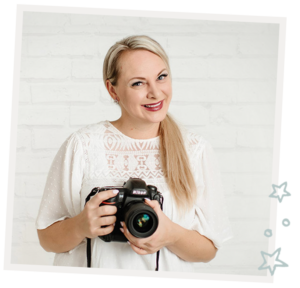
I'm
Lisa DiGeso
I’m on a mission to create uplifting online experiences for photographers ready to elevate their art, their business and their mindset.(...and have fun along the way!)









